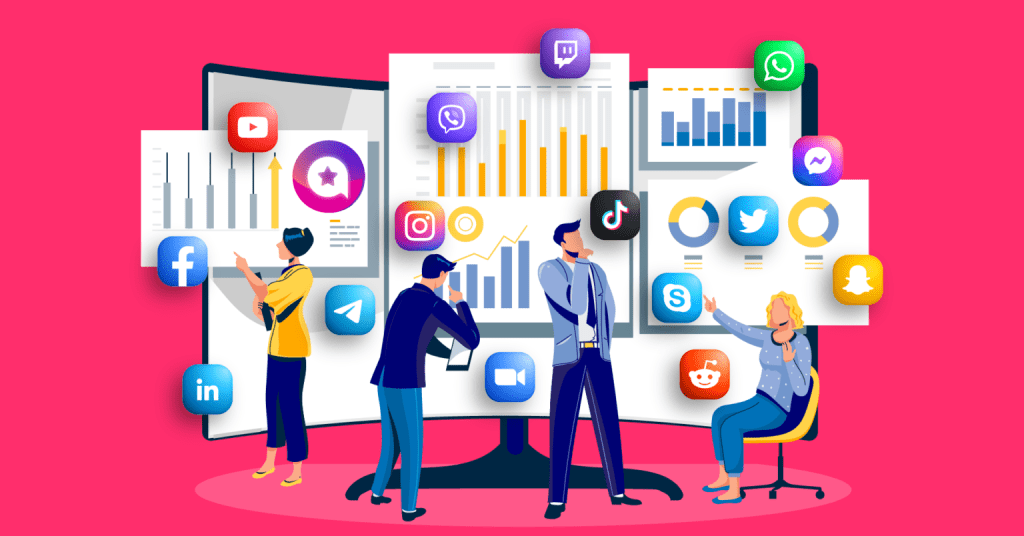Social media marketing is now a crucial component of contemporary business plans. It includes a wide range of initiatives designed to make the most of social media platforms in order to engage audiences, establish brands, and propel corporate expansion. In this article, we’ll delve into the intricacies of what is social media marketing? , exploring its definition, benefits, challenges, and future trends.
What is social media marketing?
Social Media Platforms
It’s critical to comprehend the social media platform environment before diving into social media marketing tactics. Every platform has distinct features, user demographics, and behavior patterns of its own. Businesses need to adjust their strategy to fit the platform and its audience, whether they are targeting professional networking on LinkedIn or visually stimulating material on Instagram.

Key Elements of Social Media Marketing
A clear content plan, accurate audience targeting, and captivating techniques to encourage engagement are all essential components of a successful social media marketing campaign. It is crucial to provide engaging content that appeals to the intended audience. Additionally, by knowing the tastes and behaviors of their audience, firms may customize their messaging to have the most possible impact.
Benefits of Social Media Marketing
Social media marketing has several advantages. In the first place, it raises brand awareness by enabling companies to exhibit their goods and services to a larger audience. Social media also makes it easier to interact directly with consumers, which develops deep connections and brand loyalty. Additionally, because businesses may target consumers based on their interests, demographics, and online behaviors, it frequently results in higher conversion rates.

Types of Social Media Marketing Campaigns
Social media marketing includes a range of campaign types, each with a distinct function. Influencer marketing is a strategy that uses social media personalities’ reach and influence to market goods and services. On the other hand, sponsored content targeted at a particular audience segment is known as paid advertising. The goal of content marketing is to draw in and keep customers by producing and disseminating informative material.
Also Read : How to Be a Full-Stack Developer: A Roadmap to a successful Full-stack Developer, 30 days Roadmap
Metrics for Measuring Social Media Marketing Success
Monitoring a range of data, such as reach, impressions, engagement, and conversion rates, is necessary to assess the effectiveness of social media marketing programs. Reach and impressions show how many people saw a specific piece of content, while engagement analytics track how users interacted with it—liking, commenting, sharing, etc. Conversion rates measure how well social media efforts encourage targeted behaviors like website visits and sales.

Challenges in Social Media Marketing
Social media marketing has many advantages, but it also has drawbacks. The reach and visibility of a business can be greatly affected by changes to algorithms on social media sites like Facebook and Instagram. Furthermore, businesses find it harder and harder to stand out in the deluge of digital noise due to content saturation. Effectively handling negative feedback and online reputation are two more challenges that firms need to overcome.
Future Trends in Social Media Marketing
A number of trends are influencing how social media marketing will develop in the future. Social media platforms will likely be dominated by video content, with short-form and live streaming becoming more and more popular. Businesses will be able to improve user experiences and personalize content with the incorporation of artificial intelligence (AI). Furthermore, technological developments will provide more profound understandings of audience behavior, enabling more focused and successful marketing campaigns.
Finally, it should be noted that social media marketing is still a dynamic and powerful force in the digital world. Businesses can use social media to accomplish their marketing goals and spur long-term growth by grasping the subtleties of social media platforms, utilizing essential components of successful marketing campaigns, and embracing new trends.
FAQs
- How can businesses leverage social media marketing effectively?
- through identifying their target market, producing engaging content, and genuinely interacting with people.
- What are some common mistakes to avoid in social media marketing?
- inconsistent posting frequency, too much marketing, and failing to read and react to comments.
- Is social media marketing suitable for all businesses?
- Although social media has many advantages for different businesses, its efficacy varies depending on things like target audience demographics and corporate goals.
- How can businesses measure the ROI of social media marketing efforts?
- by keeping an eye on important indicators like client acquisition expenses, conversion rates, and engagement rates.
- What role does social media advertising play in marketing strategies?
- Businesses can target particular groups with social media advertising to boost brand awareness and encourage conversions.